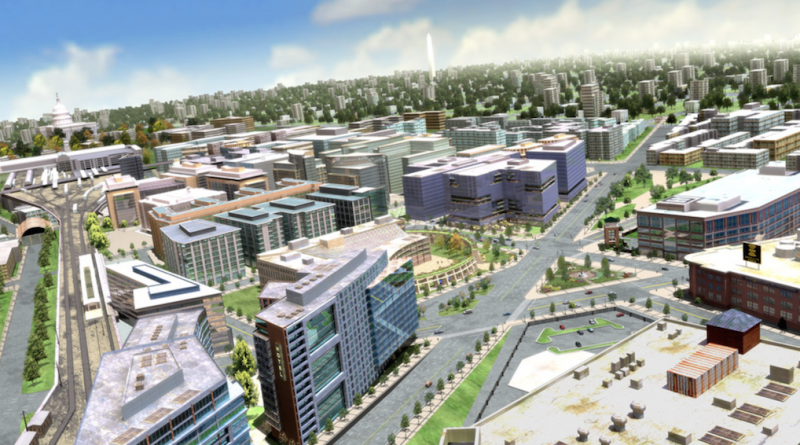$150 Million EB-5 Investment Revitalizes Entire Washington DC Neighborhood After Banks Decline to Finance
Where banks considered the financing too risky, the United States EB-5 program is turning a dilapidated part of Washington DC into a pleasant neighborhood of shops, hotels, and high-end apartments.
The Washington Post details how Chinese EB-5 money is driving a metamorphosis of the city’s NoMa (North of Massachusetts Avenue) district:
A longtime budget motel was redeveloped into two Hilton-branded hotels in 2015. A trash-sorting depot became an REI flagship in 2016 — not far from a homeless encampment beneath a railroad overpass. In addition to the Highline apartments going up on Florida Avenue, two parking lots across the street are slated for new housing and retail by late 2019. All were partially financed — between 15 and 64 percent — by foreign investors after banks declined to fully back the projects […]

Angelique Brunner, founder and president of EB5 Capital, said “it would be very scary for a financial institution to step into this neighborhood the same way they might step into downtown Washington”, and explained that developments such as those taking place in NoMa – which will provide thousands of retail and hospitality jobs in an area of high unemployment – fit perfectly with what lawmakers had in mind when they first introduced the EB-5 program in 1990.
“What we do in this neighborhood is really the heart and soul of what EB-5 was intended to be used for” said Brunner and added that she expects the program to fund at least two more developments in NoMa in 2018, bringing total EB-5 investment in the neighborhood to more than $150 million.
“We will continue to invest in this neighborhood until it’s complete — or until Congress outlaws our investment.”
Watch: EB-5 Quota Likely to Expand to 24,000 Applicants, Say Industry Leaders
Ever since the 2008 financial crisis, after which bank loans for commercial developments became much more difficult to come by, the EB-5 program – which grants a maximum of 10,000 visas a year, nearly 90% of which go to Chinese investors – has become an essential source of funding for developers across the country.
Beau Athia, who grew up on New York Avenue NE in a Super 8 motel that his parents owned after immigrating from India, said his family relied heavily on foreign investors to fund the construction of a pair of Hilton-branded hotels when they wanted to redevelop the site after the economic downturn.
“At the time when lenders weren’t willing to originate debt for new construction, EB5 Capital was more than willing to partner with us,” Athia said.

The EB-program will run out on December 8th this year unless a new law is in place or the program is extended. In an interview with Investment Migration Insider, Robert W. Kraft, President of IIUSA, the main lobbying group for the EB-5 industry, said he considers it unlikely a new law will be ready by the end of the year and instead expects legislators will once more extend the program by six months or so.
Read: The new E-2 visa bill and the difference in tax implications between E-2 and EB-5
While EB-5 participants must ordinarily invest at least half a million dollars and maintain the investment for five years before becoming eligible for a green card, the ceaseless stream of new applicants from China has led to an extensive backlog and waiting times of up to 12 years for Chinese investors, many of whom are now turning to the E2 program to realize their American Dream within months instead of years.
Christian Henrik Nesheim is the founder and editor of Investment Migration Insider, the #1 magazine – online or offline – for residency and citizenship by investment. He is an internationally recognized expert, speaker, documentary producer, and writer on the subject of investment migration, whose work is cited in the Economist, Bloomberg, Fortune, Forbes, Newsweek, and Business Insider. Norwegian by birth, Christian has spent the last 16 years in the United States, China, Spain, and Portugal.



